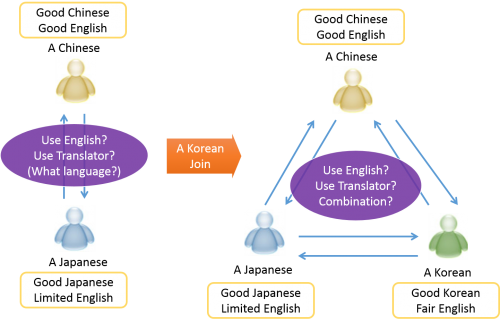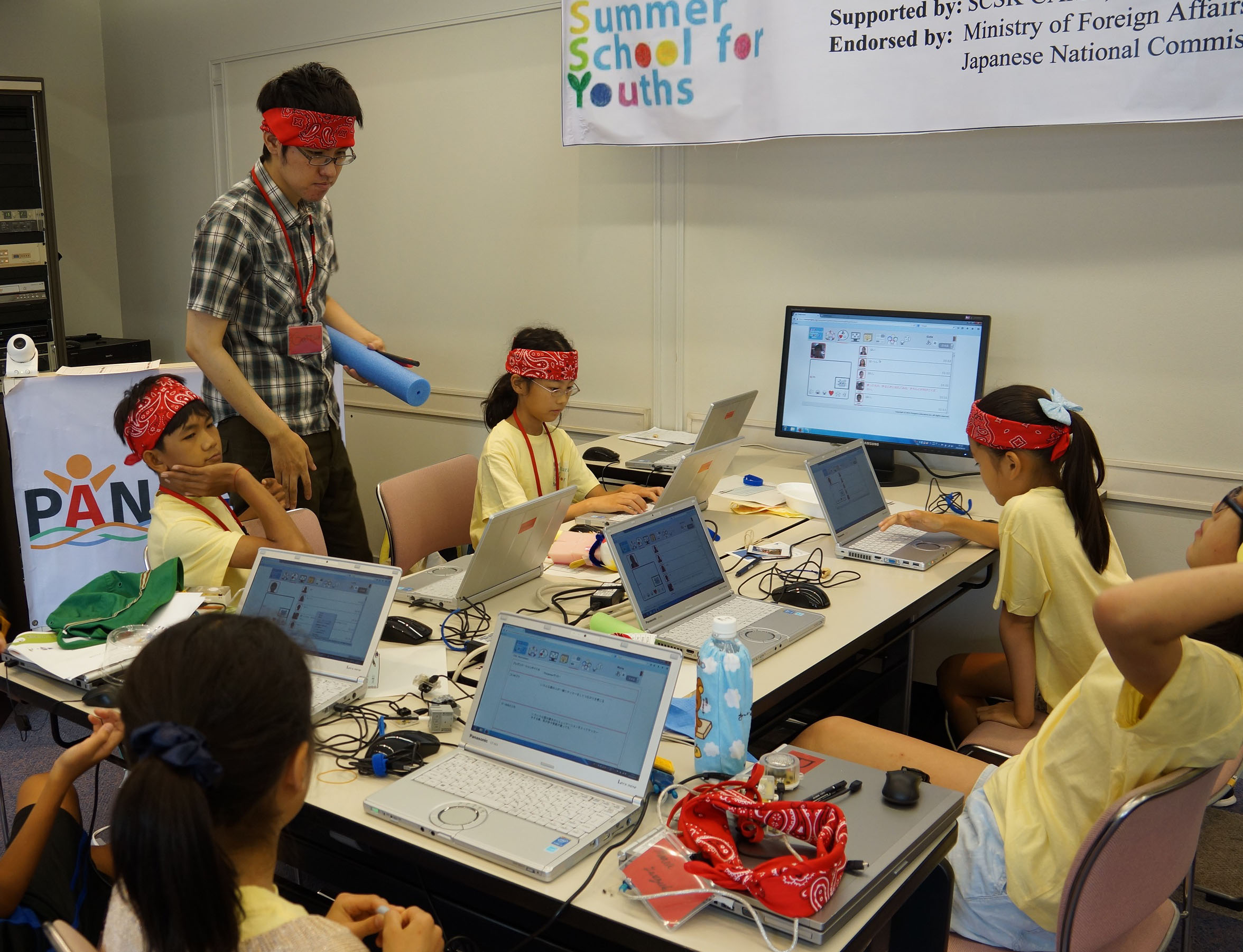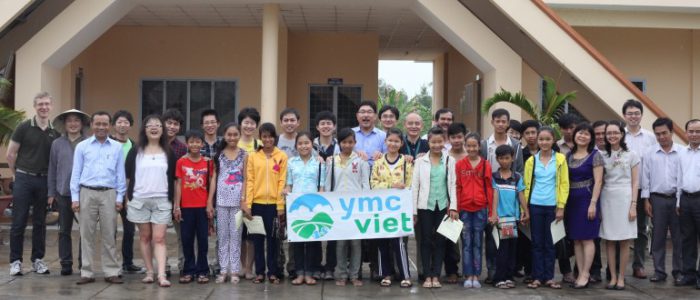Overview | Research | Selected Publications
Overview
People from different cultures and languages collaborate to meet the needs of a more and more globalized society. The Intercultural Collaboration project of this laboratory aims to provide tools, mainly based on human interface technologies, to transcend cultural barriers over distributed environments. In this project, we conduct fundamental research focusing on communication analysis beyond culture and language barriers, and develop communication supporting tools for intercultural collaboration fields as well. Our project involves wide collaboration with NPOs for international activities, and our research results make direct contributions to society. For example, we have been realizing the multilingual knowledge communication for agricultural support in Vietnam and multilingual commutation support in international symposiums and workshops for youths.
Research results in this project have been published in many top international conferences of human interface like CSCW, CHI, and IUI. We also initiated the ACM International Conference on Intercultural Collaboration, which is now developed as the ACM CABS conference.
Research
Communication Analysis
We conduct fundamental research on communication analysis, mainly focusing on cultural asymmetry in intercultural collaboration and identification of non-native speakers’ communication problems.
Nowadays, when the transportation and communication technologies have been well developed, allowing us to meet people from different cultures easier. However, people from different cultures could face some difficulties when communicate or work together. These difficulties sometimes are caused by the unequal of cultural difference understanding and language difference, which we call cultural asymmetry. Therefore, we aim at understanding and solving cultural asymmetry for intercultural collaboration. Moreover, we investigate non-native speakers’ comprehension problems by using eye-tracking methodology for designing supporting tools from the lessons learned.

Multilingual Communication Support for Youths
We work on multilingual communication support for youths as one of the fields of intercultural collaboration.
The research field is Kyoto Intercultural Summer School for Youths (KISSY), which is held by NPO Pangaea and our laboratory in each summer. KISSY is an intercultural collaboration event for children from different countries (Japan, Korea, Cambodia, Kenya and United States) to work collaboratively on some projects, usually lasting for about one week. Youths are divided into several international teams and discuss with each other by using a multilingual communication system based on the Language Grid. In this research, we model and analyze the multilingual communication among youths based on the ethnography methodology. Then, we design and evaluate the supporting systems based on the service design approach.

Multi-language Knowledge Communication for Agricultural Support in Vietnam
In this research project, we focus on agricultural knowledge support for Vietnamese farmers in the Mekong delta area by Japanese experts. Since the literacy rate of farmers in Vietnam is fairly low, the project trains Vietnamese youths to serve as communication mediators between the farmers and Japanese agricultural experts, which is called Youth-Mediated Communication (YMC) proposed by NPO Pangaea. The youths receive questions from Vietnamese farmers, communicate with Japanese experts via the YMC system, and then transfer agricultural knowledge from the experts to the farmers. In addition, they collect daily field data (e.g. temperature, humidity, pictures of paddy, etc.) and send them to the Japanese experts. The YMC system is a multi-language online social network service built on the top of the Language Grid.
The project was conducted in cooperation with Ministry of Agriculture and Rural Development of Vietnam (MARD) as part of a model project to support developing countries with ICT. This project was conducted for four seasons (about 16 months) during 2011 to 2014 in Tra On District and Dong Thanh District of Vinh Long Province, Vietnam with 15-30 participants each time. We aim at generalizing the design of multi-language knowledge communication based on the lessons learn from the service design in field studies.

Selected Publications
- [Journal]
- Chunqi Shi, Toru Ishida, and Donghui Lin. Translation Agent: A New Metaphor for Machine Translation. New Generation Computing, Vol.32, No.5, pp.163-186, 2014.
- Yue Suo, Naoki Miyata, Hiroki Morikawa, Toru Ishida and Yuanchun Shi. Open Smart Classroom: Extensible and Scalable Learning System in Smart Space using Web Service Technology. IEEE Transactions on Knowledge and Data Engineering, Vol.21, No.6, IEEE, pp. 814-828, 2009.
- [Chapter in Book]
- Toru Ishida, Donghui Lin, Masayuki Otani, Shigeo Matsubara, Yohei Murakami, Reiko Hishiyama, Yuu Nakajima, Toshiyuki Takasaki, and Yumiko Mori. Field-Oriented Service Design: A Multiagent Approach. Takashi Maeno, et.al.(Eds.), Serviceology for Designing the Future, Springer, 2016.
- Donghui Lin and Toru Ishida. User-Centered Service Design for Multi-Language Knowledge Communication. Masaaki Mochimaru, Kanji Ueda, and Takeshi Takenaka (Eds.), Serviceology for Services. Springer, pp. 309-317, 2014.
- [Conference]
- Naomi Yamashita, Andy Echenique, Toru Ishida and Ari Hautasaari. Lost in Transmittance: How Transmission Lag Enhances and Deteriorates Multilingual Collaboration. International Conference on Computer Supported Cooperative Work (CSCW2013), pp. 923-934, San Antonio, USA, 2013.
- Chunqi Shi, Donghui Lin, and Toru Ishida. Agent Metaphor for Machine Translation Mediated Communication. In Proceedings 18thInternational Conference on Intelligent User Interfaces (IUI2013), Santa Monica, USA, 2013.
- Ari Hautasaari. “Could Someone Please Translate This?” – Activity Analysis of Wikipedia Article Translation by Non-Experts. International Conference on Computer Supported Cooperative Work (CSCW2013), pp. 945-954, San Antonio, USA, 2013.
- Naomi Yamashita, Rieko Inaba, Hideaki Kuzuoka and Toru Ishida. Difficulties in Establishing Common Ground in Multiparty Groups using Machine Translation. In Proceedings of International Conference on Human Factors in Computing Systems (CHI2009), ACM, pp. 679-688, Boston, USA, April 6th, 2009.
- Daisuke Morita, Toru Ishida. Collaborative Translation by Monolinguals with Machine Translators. International Conference on Intelligent User Interfaces (IUI2009) pp.361-366 2009.
- Naomi Yamashita and Toru Ishida. Effects of Machine Translation on Collaborative Work. International Conference on Computer Supported Cooperative Work (CSCW2006), pp.515-523, 2006.
- Naomi Yamashita and Toru Ishida. Automatic Prediction of Misconceptions in Multilingual Computer-Mediated Communication. International Conference on Intelligent User Interfaces (IUI2006), pp.62-69, 2006.
